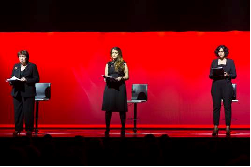March 2018 Culture and Society
Read the articles selected in March 2018
Les mises en garde de la philosophe Sylviane Agacinski
By Eugénie Bastié
Source: Le Figaro, 22 March
The techniques of transplantation and procreation put into play different social relations to which lawmakers and bioethics can’t be indifferent. The respect for the human being and its body can’t be explained by scientific evidence.
Vive les maths
By Véronique Radier
Source: L’Obs, 22 March
Mathematics is born with the mankind and there is no concrete world without maths. The emotion of its abstractness is denied to the half of the hemisphere by always influencing gender bias, and more in general by a teaching method which can turn out paralyzing and selective.
Les “millennials”, entre mythes et réalité
By Aïna Skjellaug
Source: Le Temps, 17 March
They don’t dream like their grandfathers, in the material impossibility to conceive long-term projects. Though their existential insecurity, it will be up to them taking decisions functional to the survival of our planet, while their digital skills invert the hierarchy of the knowledge with the previous generations.
Machines are getting better at literary analysis
Source: The Economist, 8 March

A recent study on the transformation of gender in English literature has used artificial intelligence for the analysis of broad databases, showing that algorithms can answer empirical questions, what makes some academics hope to measure the poetry too.
Stephen Hawking, one of the world’s great physicists, has died
Fonte: The Economist, 14 Marzo

His disability has made him more and more difficult to translate into language his theories, fantastic constructions about singularities such as the black holes and the same Universe, described as finite in time and infinite in space, opening scenarios that redefine the human place in the world.
Consulta l’articolo:
Wim Wenders: “Notre rapport à la mémoire est en danger”
By Marie-Noëlle Tranchant
Source: Le Figaro, 10 March
With the new technologies the memory is deprived of the space and the corporeality in the relations with things, individuals, and landscapes, that the cinema was keen on preserving. Through the digitalization, a lot of our history will be lost forever. For this reason, the international Festival Toute la mémoire du monde is so important.
Droits humains et cinéma: le plaidoyer d’Alain Berset au FIFDH
By Alain Berset
Source: Le Temps, 12 March
The human rights have been born from a collective imaginary which has been fed by the cinema. The UN codification has juridically recognized what, otherwise, would have lain in an ideal world. To this day, the right to enjoy art allows the dreams to come true and never to end.
“Les droits individuels règnent sans partage jusqu’à faire périr l’idée du bien commun”
By Guillaume Perrault
Source: Le Figaro, 12 March
If the human rights are universal, how we can judge other cultures? The human rights represent the freedom without the law. A certain rule which delimits a common good comes into conflict with the unconditional right to completely be what we are or we want to be.
Ovation pour les ministres interprètes des “Monologues du vagin”
By Gaëlle Dupont
Source: Le Monde, 8 March

A strong political message has been launched by three female ministers of the French government that have interpreted The Vagina Monologues by Eve Ensler, translating the official discourse about female rights in the story of the oppression, the aspirations and the pleasure of us all women.
Read more:
Dall’America di Trump alle vicende di casa nostra: le donne protagoniste
Source: Tor Vergata Comitato Unico di Garanzia
Within a conference on women’s role in the society Tor Vergata university has hosted the launch of the book Orgoglio e pregiudizi by the RAI journalist Tiziana Ferrario, who observes the awakening of the feminist awareness in the USA and in the world after Trump’s electoral campaign.
Read more:
Women’s conference defies Vatican over nuns and equality
By Harriet Sherwood
Source: The Guardian Domestic, 5 March
The demand for the gender parity has crossed the doors of the Catholic Church, where women as nuns play subordinate roles, serving the Cardinals and Bishops that don’t mind their qualifications and competencies. So they are nearly excluded from decision-making processes and live in dire and precarious economic conditions.
Nie mehr Prinzessin?
By Anke Schipp
Source: Die Faz, 1 February

Gender distinctions and stereotypes triumph in the Carnival costumes. As they are conventional when they choose their mask, psychologists say that children play dressing up to mirror themselves in the other. But also little girls know that a good game is short.
Read more:
Children’s books
Source: The Observer Domestic, 21 January
A British study has revealed a predominance of male characters in the children literature, most evident in animals figures, distinguished into male and female gender after their strength, villainy or rather vulnerability as prey, and even for their capacity to speak.
L’histoire secrète des damnés du mercure
By Xavier Lambiel
Source: Le Temps, 24 February
A historical investigative report has unearthed from the secret archives of a giant in the Swiss chemical industry data that show 250 mercury poisonings, occurred between 1917 and 1950 among its workers, and recognized as occupational diseases only after decades of resistance.
How do you beat radicalisation?
By Liz Lightfoot
Source: The Guardian, 20 February
An experiment in a Birmingham primary school aims to teach children that we are all different and welcome, regardless of our faith, color or culture, in the hope that by feeling accepted in the society at an early age, they grow less susceptible to radicalization.
In children’s books, pictures can paint a thousand words
By Nora Krug
Source: The Washington Post, 24 February
A picture book by Matt de la Peňa on the sides of love explained to children, highlights the importance of honesty in children’s literature which mirrors them in their daily emotions and offers a thousand words to communicate with adults.
Women “wrote larger proportion of fiction in 1850 than in 1950
By Alison Flood
Source: The Guardian, 20 February
An algorithm used to analyze 104.000 works of fiction from 1870 to 2007 found a decline in the proportion of female novelists from the 19th century to today, which occurred when novel-writing become a high-status profession and is associated with the drop in female characters and the gentrification of language.
Info
- Pubblicato il : 05/04/2018 Modificato il : 04/04/2019
Allegati
- Machines are getting better at literary analysis pdf
- Les mises en garde de la philosophe Sylviane Agacinski pdf
- Vive les maths pdf
- Les millennials, entre mythes et réalité pdf
- Les droits individuels et l'idée du bien commun pdf
- Droits humains et cinéma pdf
- Notre rapport à la mémoire est en danger pdf
- Children's books pdf
- Women's conference defies Vatican over nuns and equality pdf
- Female larger proportion of fiction in 1850 than in 1950 pdf
- Thousand words pdf
- How do you beat radicalisation pdf
- Damnés du mercure pdf

